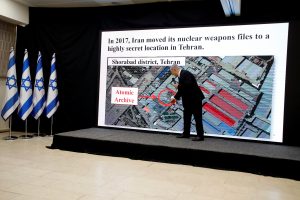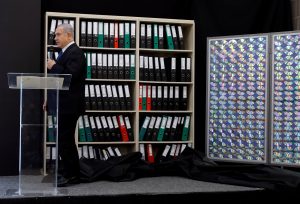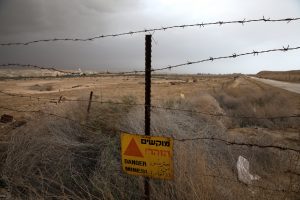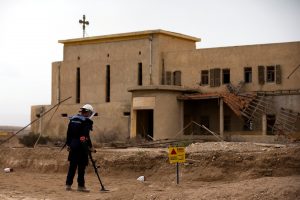
By Yara Bayoumy and Brian Love
WASHINGTON/PARIS (Reuters) – Dismayed European allies sought to salvage the international nuclear pact with Iran on Wednesday after President Donald Trump pulled the United States out of the landmark accord, while Tehran poured scorn on the U.S. leader.
“The deal is not dead. There’s an American withdrawal from the deal but the deal is still there,” French Foreign Minister Jean-Yves Le Drian said.
Iranian Supreme Leader Ayatollah Ali Khamenei, who had been reluctant to back the deal, said: “Mr Trump, I tell you on behalf of the Iranian people: You’ve made a mistake…I said many times from the first day: don’t trust America.”
French President Emmanuel Macron was due to speak later in the day to his Iranian counterpart Hassan Rouhani, Le Drian said. Iran also signaled its willingness to talk.
Trump announced on Tuesday he would reimpose U.S. economic sanctions on Iran to undermine what he called “a horrible, one-sided deal that should have never, ever been made”, which was “defective at its core”.
The fruit of more than a decade of diplomacy, the agreement was concluded in 2015 by the United States, France, Britain, Germany, Russia, China and Iran.
It was designed to prevent Iran obtaining a nuclear bomb in return for lifting sanctions that had crippled its economy.
Trump complained that the deal, the signature foreign policy achievement of his Democratic predecessor, Barack Obama, did not address Iran’s ballistic missile program, its nuclear activities beyond 2025 or its role in conflicts in Yemen and Syria.
His decision raises the risk of deepening conflicts in the Middle East, puts the United States at odds with European diplomatic and business interests, and casts uncertainty over global oil supplies. Oil prices rose more than 2 percent, with Brent hitting a 3-1/2-year high. [O/R]
The deal could also strengthen the hand of hardliners at the expense of reformers in Iran’s political scene.
“REGION DESERVES BETTER”
France’s Le Drian, German Chancellor Angela Merkel and the International Atomic Energy Agency (IAEA) all said Iran was honoring its commitments under the accord.
“The region deserves better than further destabilization provoked by American withdrawal,” Le Drian said.
The European Union said it would remain committed to the deal and would ensure sanctions on Iran remain lifted, as long as Tehran meets its commitments.
The Kremlin said Russian President Vladimir Putin was “deeply concerned” by the withdrawal, the RIA news agency said
Merkel said that, while the existing deal should not be called into question, there should be discussion of “a broader deal that goes beyond it”. British Foreign Secretary Boris Johnson spoke of a “follow-on agreement” but said it was now up to Washington to come up with concrete proposals.
Macron’s contact with Rouhani will be followed by meetings next week involving the Iranians and European counterparts from France, Britain and Germany.
But Iran’s Khamenei appeared skeptical, saying: “I don’t trust these three countries.”
The prospects of saving the deal without Washington depends in large part on whether international companies are willing and able still to do business with Iran despite the U.S. sanctions.
Le Drian said meetings would be held with major firms including oil giant Total <TOTF.PA>.
In a harbinger of what could be in store, Trump’s new ambassador to Germany said German businesses should halt their activities in Iran immediately.
French Finance Minister Bruno Le Maire said the United States should not consider itself the world’s “economic policeman”. Britain and France said they would do their utmost to protect their business interests in Iran, while Germany said it was seeking details of the effect of U.S. sanctions.
European companies including carmaker PSA <PEUP.PA>, plane manufacturer Airbus <AIR.PA> and engineering group Siemens <SIEGn.DE> said they were watching the situation.
In a speech carried on his official website, Khamenei said Trump’s announcement had been “silly and superficial”, adding: “He had maybe more than 10 lies in his comments.”
“DEATH TO AMERICA!”
Lawmakers in Iran’s parliament burned a U.S. flag and a symbolic copy of the deal, known officially as the Joint Comprehensive Plan of Action (JCPOA), chanting “Death to America!”.
President Hassan Rouhani, a reformist who had hoped that the deal would boost living standards in Iran, struck a more pragmatic tone in a televised speech, saying Iran would negotiate with European Union countries, China and Russia.
“If at the end of this short period we conclude that we can fully benefit from the JCPOA with the cooperation of all countries, the deal will remain,” he said.
Trump’s decision adds to the strain on the transatlantic alliance since he took office 16 months ago. One by one, European leaders came to Washington and tried to meet his demands, while pleading with him to preserve the deal.
The Trump administration kept the door open to negotiating another deal with allies, but it is far from clear whether the Europeans would pursue that option or be able to convince Iran to accept it.
China’s foreign ministry said Beijing would defend the deal and urged parties “to assume a responsible attitude”.
A Western diplomat who declined to be named was more pointed about the decision. “It announces sanctions for which the first victims will be Trump’s European allies,” the diplomat said, adding that it was clear Trump did not care about the alliance.
Abandoning the pact was one of the most consequential decisions of Trump’s “America First” policy, which has led him to quit the global Paris climate accord, come close to a trade war with China and pull out of an Asian-Pacific trade deal.
It also appeared to reflect the growing influence within the administration of Iran hawks such as new National Security Adviser John Bolton and Secretary of State Mike Pompeo, who arrived in Pyongyang on Wednesday to prepare for a summit that Trump hopes will secure North Korea’s denuclearisation.
COMPLYING WITH DEAL
Iran denies long-held Western suspicions that it tried in the past to develop atomic weapons and says its nuclear program is for peaceful purposes.
Senior U.S. officials themselves have said several times that Iran is in technical compliance with the pact.
Renewing sanctions would make it much harder for Iran to sell its oil abroad or use the international banking system.
Iran is the third-largest member of the Organization of the Petroleum Exporting Countries and pumps about 3.8 million barrels per day of crude, or just under 4 percent of global supply. China, India, Japan and South Korea buy most of its 2.5 million bpd of exports.
Its rial currency plunged to a record low against the U.S. dollar in the free market, after sliding for months because of a weak economy, financial difficulties at local banks and heavy demand for dollars among Iranians who feared that renewed U.S. sanctions would hit Iranian exports hard.
“I am scared,” 47-year-old Isfahan school teacher Morad Sabzevari said by telephone. “I listened to Trump’s speech on English news channels last night…It was a declaration of war against Iran … It means dark days and months are ahead of us.”
The U.S. Treasury says sanctions related to Iran’s energy, auto and financial sectors will be reimposed in three and six months.
U.S. Treasury Secretary Steve Mnuchin said a license for Boeing Co <BA.N> to sell passenger jets to Iran will be revoked, scuttling a $38 billion deal. The ban will also hit Europe’s Airbus <AIR.PA>, whose planes contain U.S.-made parts.
Trump said the nuclear agreement did not prevent Iran from cheating and continuing to pursue nuclear weapons.
“It is clear to me that we cannot prevent an Iranian nuclear bomb under the decaying and rotten structure of the current agreement,” he said.
Trump said he was willing to negotiate a new deal with Iran, but Iran has already ruled that out.
Iran’s growing military and political power in Yemen, Syria, Lebanon and Iraq worries the United States, Israel and Washington’s Gulf Arab allies such as Saudi Arabia.
Among the few nations to welcome Trump’s decision were Israel and Saudi Arabia, Iran’s arch-foes in the Middle East.
Less than 24 hours after Trump’s announcement, Saudi Arabia said it had intercepted missiles fired at Riyadh by the Iran-aligned Houthi forces it is fighting in Yemen.
(Reporting by Steve Holland; Additional reporting by Tim Ahmann, Makini Brice, Warren Strobel, Jonathan Landay and Arshad Mohammed, Patricia Zengerle, David Lawder, Mohammad Zargham in Washington, Ayenat Mersie in New York, Sybille de La Hamaide, John Irish and Tim Hepher in Paris, Parisa Hafezi in Ankara, David Milliken and Bozorgmehr Sharafedin in London and Andrew Torchia in Dubai; Writing by Angus MacSwan and Kevin Liffey)














